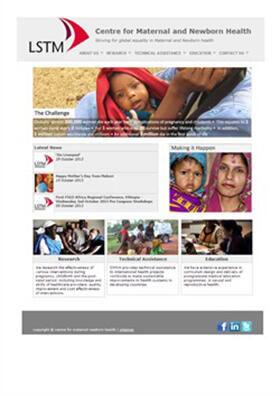
LSTM’s Centre for Maternal and Newborn Health (CMNH) have launched a new look website to highlight their research and life-saving work in developing countries.
CMNH is a global centre of excellence which aims to improve the quality of life of mothers and babies worldwide by reducing mortality and morbidity.
The Centre offers unique expertise in research and developing evaluation frameworks, and partners strategically with governments and global agencies to ensure the lessons learnt are shared widely.
Head of the Centre, Prof Nynke van den Broek, said: “I hope that the new website helps people to understand our vision for reducing maternal and newborn mortality and morbidity, and the number of different ways in which they can get involved in helping us.
All of our work is research-led and the website will help us communicate our findings with fellow academics, policy-makers and funders.
We also rely on volunteers, and there is detailed information on how maternal health professionals in this country can get involved and what others have gained from the experience.”
CMNH currently works across 11 countries in sub-Saharan Africa and South Asia, creating innovative healthcare packages that focus on continual improvement in the availability of care, the quality of care and measuring the effectiveness of care.
The new website provides maps of activity in the different countries the Centre works in as well as a history of the work that has been carried out to date and their plans to expand the work to reach even more mothers and babies.
There is an opportunity to learn more about the team of academic and management specialists that make up CMNH and details of how people can get involved- through collaboration, volunteering or making a donation. Making It Happen (MiH) is the largest programme delivered by CMNH and sees the team working with UK based volunteer midwives and obstetricians to build the capacity of health care providers in developing countries, with the aim of making pregnancy and childbirth as safe as possible.
The programme is funded by the UK’s Department for international Development (DFID) and UNICEF..